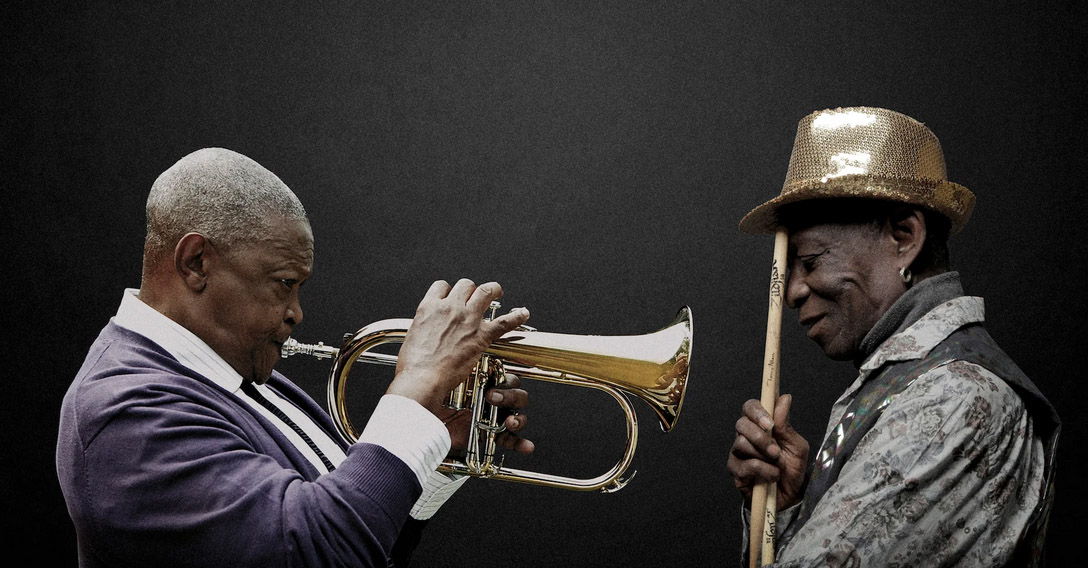A Final Conversation with Fela Kuti Drumming Pioneer Tony Allen

Hugh Masekela and Tony Allen: photo by Brett Rubin and Bernard Benant
Afrobeat pioneer Tony Allen passed away yesterday. Our feature on the drumming legend appears in the April_May issue of Relix.
Tony Allen remembers when the idea for Rejoice— the Nigerian drummer’s collaboration with Hugh Masekela, the late South African trumpet and flugelhorn master—was born. “It was in 1984,” says Allen, calling from France, where he moved around that same time.
They had met long before that, in Lagos, Nigeria, in the early 1970s, during the 15-year stretch when Allen served as the drummer and musical director for Fela Anikulapo Kuti’s band, Africa 70. Masekela—an international jazz star who had performed at the Monterey Pop Festival in 1967, recorded with The Byrds and Paul Simon, and scored a No. 1 U.S. single in 1968 with “Grazing in the Grass”—had been a fan of Fela and his brand of Afrobeat, a hybrid West African genre fueled, in large part, by Allen’s churning polyrhythms.
“Hugh told me he was coming to Lagos,” Allen recounts while describing their initial introduction. “He liked me and he liked Fela’s ideas. I met him at Fela’s [musical temple] The Shrine, but it took years before we worked together.”
It took 26 years, to be exact. In the interim, the two musicians, both of whom maintained heavy touring and recording schedules, ran into each other periodically at music festivals around the globe—once again reiterating their mutual desire to get into the studio together—while never actually acting on the notion.
Finally, in 2010, Nick Gold, a record producer for the London-based World Circuit label—whose output has included revered titles by Buena Vista Social Club, Ali Farka Touré and Orchestra Baobab, among many others— corralled the two musicians when their respective schedules found them in the U.K. at the same time.
Now the only question was: What would they record? The two had admired each other for many years but had never actually made music together.
“We went into [London’s Livingston Studios] to do it, but we didn’t know how it was going to be done,” Allen reminisces. “I wanted to do jazz but not swing, not Western music. And I didn’t want to sing. I wanted my music and Hugh’s music to crisscross.”
It was Allen who came up with the idea of improvising and, from the resultant jams, shaping the eight tunes that now comprise Rejoice. “I told him: ‘I’ll have my bass player from Paris assist us. The music must be in some key, at least, and the melody has got to be there. I’m going to lay down my [drum] patterns, and it’s not going to be the same pattern every time. But I want you to relate to every pattern that I lay down and I want you to compose something on top of that. The foundations that he worked on were my bottoms.”
The weekend sessions went well, but they left London knowing there was more work to be done. Then, once again, they’d see each other in passing year after year, promising to make a completed album out of the raw jams they’d put down with Gold’s help.
But nothing happened— and the recordings sat untouched—until Jan. 23, 2018, when Hugh Masekela succumbed to prostate cancer in Johannesburg, South Africa. He was 78.
“We intended to finish it, but we never went back to the studio again, and it started looking like an abandoned project,” Allen recalls. But rather than allow the music to remain unheard, Allen and Gold reimagined their unfinished creation as a tribute to the fallen giant. And Gold, with the blessing and input of Allen and the Masekela estate, put together a group of sympathetic, young European musicians; the final impromptu band included bassists Tom Herbert and Mutale Chashi, keyboardists Joe Armon-Jones and Elliot Galvin, vibraphonist Lewis Wright, tenor saxophonist Steve Williamson and percussionist Lekan Babalola. The music, issued on the newly relaunched World Circuit, is primarily instrumental, although both Masekela and Allen ended up contributing vocals. (It also has the distinction of being Masekela’s first posthumous release.)
Allen’s speaking voice can be heard on the track “We’ve Landed,” which he says is dedicated to the youth of the world. “I didn’t want to use my voice at all but I was forced to do that,” he explains. “My message there is for the young generation, for the future. I think, from age 17, you start flowing into the future, and then it explodes. They should wake up; you have to know what you’re going to do in the future.”
Likewise, Masekela’s voice can be heard on “Never (Lagos Never Gonna Be the Same),” which expresses the South African’s surprise at the many changes he’s witnessed in the Nigerian metropolis between the Fela years and his last visit there. “He had to go back there after Fela’s death and he could see the difference,” says Allen. “That’s what he was emphasizing.”
Allen says that collaborating with Masekela was rewarding on both the artistic and personal levels. “I found him to be a guy that tried to explore,” he says. “He did not play strictly straight jazz; he had his Zulu style of jazz. He was different; his approach was completely unique. I loved him from the beginning, when I was listening to the works that he did with some Africans in the States. I didn’t know then that we would end up in the studio together.”
Now approaching 80 and still prolific—his chops and power undiminished—Allen says he would like to try similar collaborations. Anyone in particular? “No,” he says. “I’m open to everyone.”




















